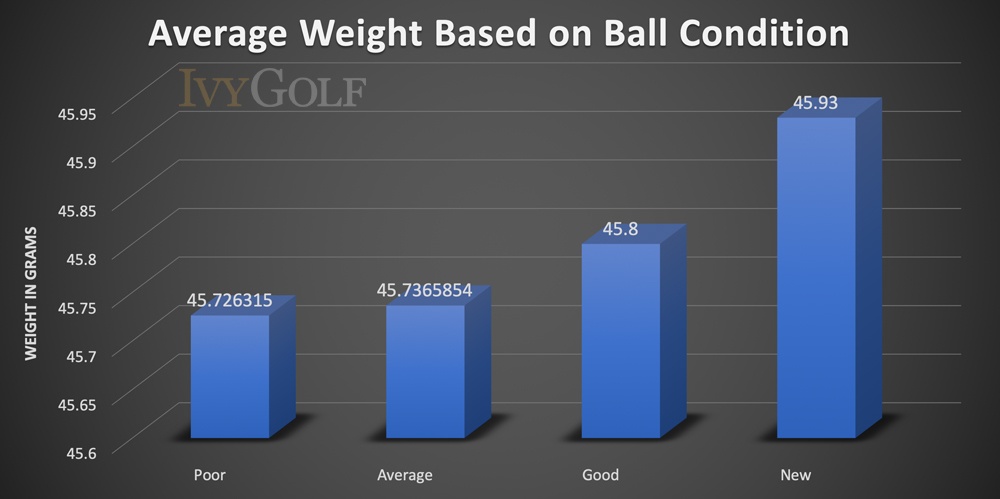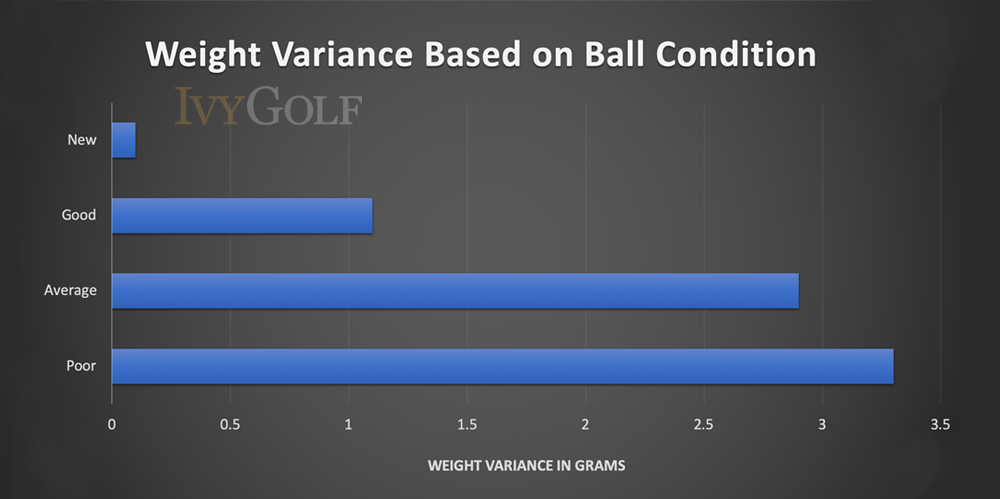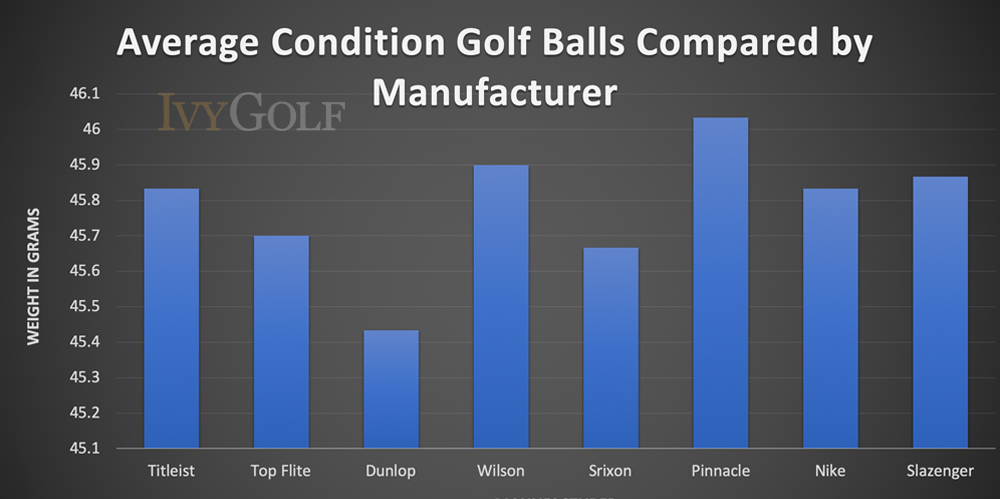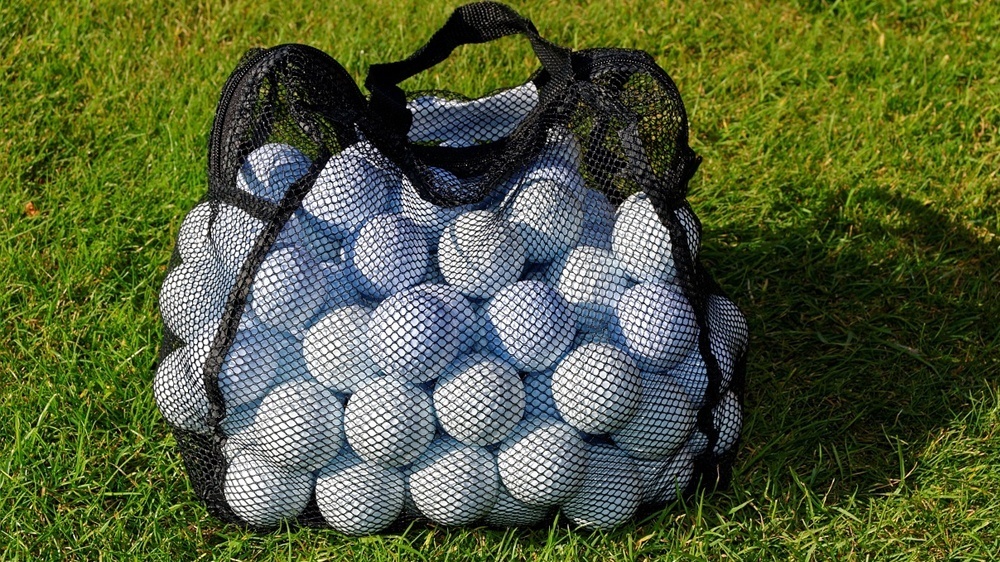If you check the rules, you’ll find that a golf ball must weigh no more than 45.93 grams.
I wanted to dive a little deeper to get an idea of what the average golf ball weighs and try to understand what factors affect this. I weighed 100 golf balls and in this article, I’ll be documenting my findings.
Findings Overview:
Visit the findings section to see how I arrived at the following conclusions:
- The better the condition of the ball, the heavier it will be on average.
- Playing balls in poor or average condition means you could see a big difference in weight from one ball to the next. The variance between average condition golf balls was 2.9 grams, with poor condition balls showing a 3.3 gram difference.
- If you want reliability in ball weight playing new balls is your best bet with just 0.1 grams in weight variance across the balls I weighed.
The Sample:
I started with well over 100 golf balls. I filtered out balls that were too damaged to see the manufacturer or model. I also removed any single Balls (I only selected brands that had at least five balls). I ended up with 100 golf balls which I felt would be a good sample size. This amount allowed me to get an average weight and determine whether brand and ball condition affects it. In terms of condition, balls were broken down into the following categories:
- Poor – visible damage to the point that the ball is unplayable, such as holes/cuts in the ball or sections missing.
- Average – some visible damage such as small scuffs or marks but appears fine to play with.
- Good – no visible damage to the ball, you can only just tell it’s been used.
- New – brand new golf ball never been used before.
There were a total of 8 different ball brands in the sample ranging from Titleist to Top Flite. Models of ball differed with a total of 52 different models were weighed.
Golf Ball Brands:
Titleist, Top Flite, Dunlop, Wilson, Srixon, Pinnacle, Nike and Slazenger.
Golf Balls by Condition:
- New – 5 Balls
- Good – 16 balls
- Average – 41 balls
- Poor – 38 Balls

Weighing the Balls:
For validating the accuracy of the scales, I used three different digital scales to compare weights. Weight was given to the nearest tenth of a gram, and every ball cleaned before being weighed.

How Much Does a Golf Ball Weigh? Findings
As you can see from the graph below, the trend that shows the average golf ball gets heavier as the condition improves. What’s interesting is that the average weight difference between a new ball and one in poor condition is just 0.21 grams.

The averages suggest there’s little difference in the weight of a new golf ball when compared to one that’s in poor condition. The Variance between the heaviest and lightest ball in each category suggests differently.

The data above shows the difference between the heaviest and lightest balls in each condition category. So as you can see, there was very little difference (0.1 grams) in weight between brand new balls. The difference between the heaviest and the lightest ball in good condition was 1.1 grams.
When looking at the weight disparity in balls in average or poor condition, the difference was significantly larger. There were 2.9 grams and 3.3 grams of variance in average and poor balls, respectively.
The variance in poor golf balls was so large that poor condition golf balls accounted for both the heaviest and lightest golf ball I weighed. The lightest ball was a Dunlop 65 at 43.5 grams, with the heaviest being a Wilson Staff TC2 at 46.8 grams.
I can only speculate the reasons behind the disparity in poor and average balls. It is worth noting some poor condition balls had openings that allow debris in. This could explain how golf balls in poor condition can be considerably heavier with the 46.8 gram Wilson Staff TC2 ball an example of this.
Comparing Brands
To get a picture of how weight can differ based on the manufacturer, I decided to compare the golf balls in average condition. I selected three random balls in average condition from each of the manufacturers; the graph below shows how they compared.

The majority of golf balls in average condition all weigh within 0.3 grams of the 45.93 limit. The Dunlop balls were the lightest at 45.43 grams on average, with the heaviest balls being Pinnacle weighing over 46 grams – heavier than the legal limit.
Findings
- The better the condition of the ball, the heavier it will be on average. Poor balls weighed 45.72, average balls weighed 45.73, good balls weighed 45.8 and new balls weighed 45.93 on average.
- If you play poor condition balls, you could see a weight difference of 3.3 grams from one ball to another. If you play average condition balls, they could differ up to 2.9 grams in weight from one ball to the next.
- New golf balls have very little difference in weight from one ball to another with 0.1 grams difference between the new balls we weighed. Playing balls in good condition means you’re only likely to see about a 1.1 gram difference in weight between balls.
- There’s barely any difference in weight averages across manufacturers, with just a 0.7 gram variance in average condition golf balls between Titleist, Top Flite, Dunlop, Wilson, Srixon, Pinnacle, Nike and Slazenger.
Conclusion
As tedious as the weighing process was, on the whole I loved carrying out this experiment and dissecting the data. I’m happy with the outcome and believe a good variety of balls were tested in terms of both condition and manufacturer. In terms of their quality, balls ranged from beginner golf balls to top of the range models. There is also room to expand on the dataset in the future.
